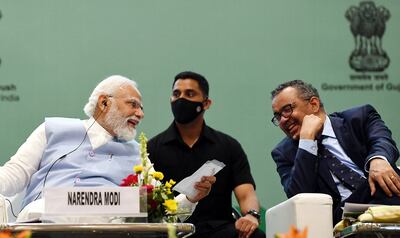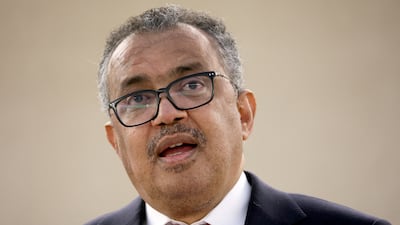The World Health Organisation's first summit on traditional medicine opened in India on Thursday with the aim of generating political support and a scientific basis for alternative treatments.
The two-day summit is being held alongside a meeting of G20 health ministers in the city of Gandhinagar in Gujarat state.
Calling traditional medicines “a first port of call for millions of people worldwide”, the WHO said it aims to establish their safety and efficacy through scientific research so that those who use them are better protected.
“For centuries, traditional and complementary medicine has been an integral resource for health in households and communities. It has been at the frontiers of medicine and science, laying the foundation for conventional medical texts,” the WHO said on Thursday.
“It will be a platform for all stakeholders, including traditional medicine workers, users and communities, national policymakers, international organisations, academics, private sector and civil society organisations, to share best practices and game-changing evidence, data and innovation on the contribution of traditional medicine to health and sustainable development,” it said.
The UN agency defines traditional medicine as the knowledge, skill and practices based on the theories, beliefs, and experiences indigenous to different cultures used in the maintenance of health as well as in the prevention, diagnosis, improvement or treatment of physical and mental illness.
It noted that about 40 per cent of pharmaceutical products are based on natural products, and that many landmark drugs derive from traditional medicine.
WHO Director General Tedros Adhanom Ghebreyesus at the summit said it could be the "starting point for a global movement to unlock the power of traditional medicine through science and innovation". Indian Prime Minister Narendra Modi is expected to address the summit.
“Traditional medicine is as old as humanity. At some point in our lives, we use some form of traditional medicine. WHO is working to build the evidence and data to inform policies and regulations for safe, cost-effective, equitable use for traditional medicines,” Dr Tedros said.
Mr Modi and Dr Tedros laid the foundation stone for a WHO Centre for Traditional Medicine in Jamnagar, Gujarat, in May last year. Its stated goal is to serve “as a knowledge hub with a mission to catalyse ancient wisdom and modern science for the health and well-being of people and the planet”.

The WHO said that 170 member states have reported to it on the use of traditional medicine and requested evidence and data to inform policies, standards and regulations for its safe, cost-effective and equitable use.
"We urge all countries to commit to examine how best to integrate traditional medicines into their national health systems. I urge all to identify specific evidence-based and actionable recommendations that can inform the next WHO traditional medicine global strategy," Dr Tedros said.


